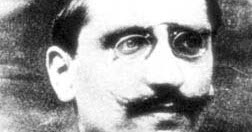| LEBESGUE Center | |
|---|---|
 |
Foundations, Interactions, Applications and Training in Mathematics |
Lebesgue started his professor career in Rennes in 1902 where he finished in particular his leçons sur l'intégration in december 1903. His name represents our aims : an international Center and Graduate School for foundations, interactions, applications and training in Mathematics.
Founding members are the Institut de recherche mathématique de Rennes (Irmar) and the Laboratoire de mathématiques Jean Leray (LMJL) in Nantes, both centers being recently appointed the maximal grading (A+) by the French Evaluation Agency for Research and Higher Education (AERES). A third founding member will be the Mathematics Department of the Brittany branch of the École Normale Supérieure (ÉNS) Cachan : this branch will constitute in 2013 the independent ÉNS Rennes, besides the three existing ÉNS in Paris, Cachan and Lyon, elite schools where most of French mathematicians studied. Including the ÉNS Rennes in our project ensures a continuous flow of highly trained students to the Center. Future extension to Brest and Angers (both with AERES grading A) should be considered.
Rennes and Nantes are about an hour close to each other. The founding members involve more than 200 scientists and 100 doctoral and postdoctoral students together with technical and administrative staff of about 20. Our aim is to build a highly attractive and efficient Research Center and Graduate School in Western France, the Lebesgue Center and Graduate School for Mathematics. Major roles for the Center will be the coordination of research in geometry, analysis, statistics and probabilities with strong interdisciplinary links to the socio-economic environment and its applications in particular for other excellence clusters in western France (sea, computer science, materials, health). The Center will provide exceptional training through its broad spectrum in mathematics and their interactions, as well it projected specialized thematic semesters that will focus on and review the state of the art in specific domains, helping to emerge key issues in mathematical and multidisciplinary research.
The presence of highly selected students of the ÉNS Rennes and Rennes 1 Magistère will be a chief asset , pre-doctoral and doctoral fellowships will ensure the attractiveness of the Graduate School on both a national and international level. Another major role will be the coordination of its restructuring effects on mathematics in Western France. The research Mathematics Centers there already have a common background through the West Math PhD-commitee which has been coordinating all PhD and Habilitation defences for more than fifteen years ; a common publishing platform is currently built to support the future activities of the Lebesgue Center. These links will be pushed much further through the projected common activities of the Center, as well as the use of modern access grids, via the new immersive class rooms which simplify significantly research and training between the sites.
The Center will be run by its director San Vũ Ngọc (Irmar, University of Rennes) and a small Executive Board formed by Laurent Guillopé, Christoph Sorger (LMJL, University of Nantes) and Arnaud Debussche (Irmar, ENS Cachan). This board will be assisted by a Scientific Advisory Board, that will define the scientific policy and strategy of the Center, and oversee the selection of applicants for Master/PhD scholarships. The Scientific Advisory Board will be made up of a total of 12 scientific personalities, from the founding members of the Center (8), from Brest (1) and Angers (1), representing the main mathematical fields of the Center, and two exterior personalities. On a more administrative side, a support manager in Rennes and a support secretary in Nantes will be needed to run the daily tasks of the Center, in coordination with the already existing structures in Irmar and LMJL. The International Scientific Orientation Board will oversee the main scientific directions of the Center and Graduate School, ensure its overall excellence and preside over regular exterior evaluations. It will be composed of eight foreign scientific personalities, with experience in running large scale research projects.
